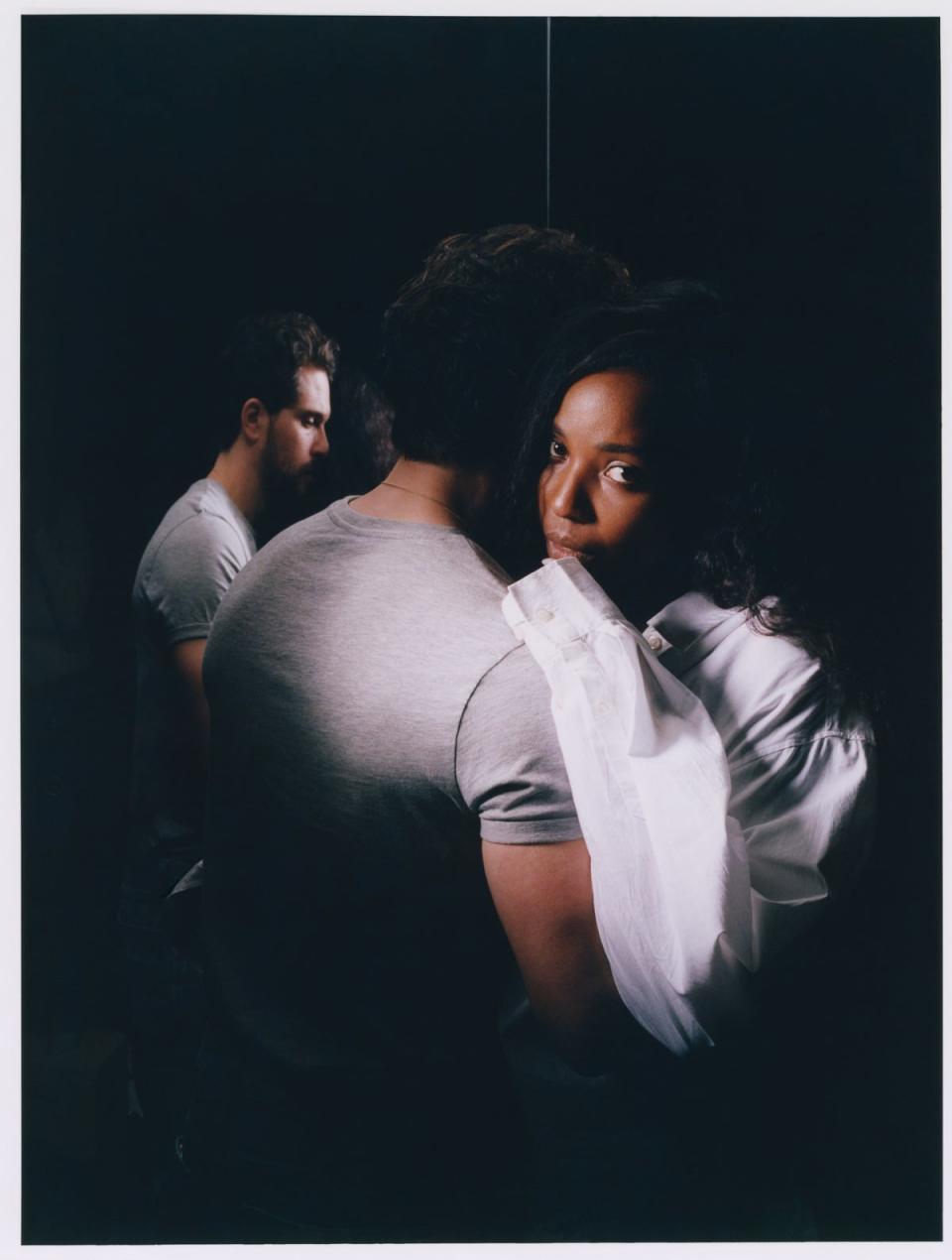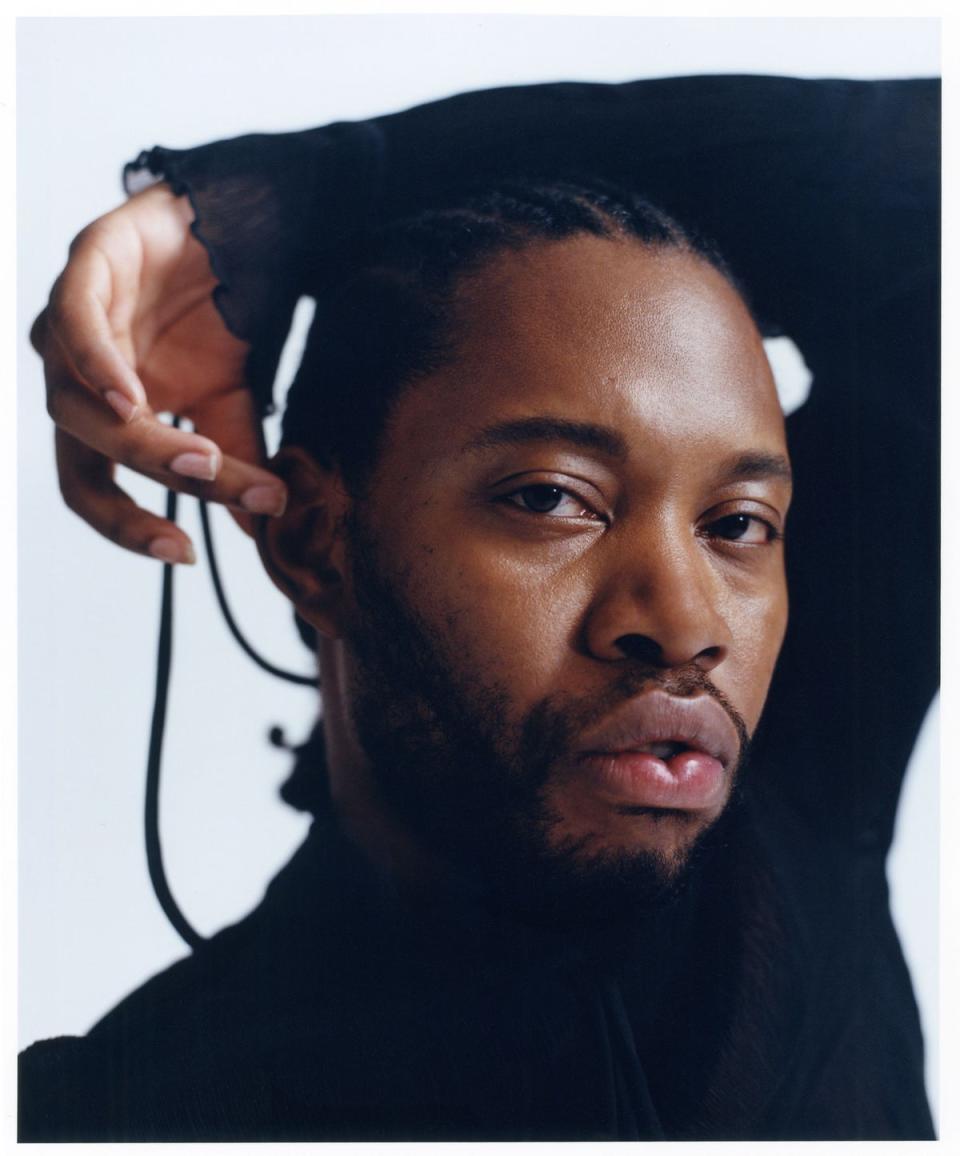There was little surprise when Jeremy O. Harris’ 2018 work Slave Play transferred to Broadway less than a year after its premiere. There was a genuine clamor for its first performances at the 198-seat New York Theater Workshop, which critics had described as “deliberately provocative, ostentatiously transgressive and utterly unsettling” and “wildly imaginative.” The show’s run was extended and tickets for all performances sold out.
Not long after, when it opened on Broadway for a limited 17-week run, the reviews remained as intriguing as the show’s premise: Slave Play about three interracial couples who seek antebellum (pre-Civil War era) sex therapy ( costumes). included) when the black partner is no longer attracted to the white partner. Their conversations touch on everything from desire, power, trauma to academic rigor – and the result is a groundbreaking, thoroughly exciting piece.
Now Harris’ play is moving to the West End, where it will run at the Noël Coward Theater from June 29 to September 21, starring Game of Thrones’ Kit Harington. The casting and content indicate that this will likely be one of the most talked about plays of the year. Here’s everything else you need to know.
What is it about?
Written while 35-year-old Harris — who is black and queer — was still at the Yale School of Drama, Slave Play is about three couples who undergo a kind of period drama sex therapy. The black partners are no longer sexually attracted to their white partners, and Harris looks at the reasons behind this. This exploration delves deep into the psyches of the characters, who all have different types of physical and emotional dysfunctions.
Shockingly, in some scenes both partners wear the same clothes that their ancestors may have worn during the plantation era, and the antebellum therapy includes scenes in which they play slaves and slave owners who shout orders and then have sex.
“He subverts the historical fantasies of a genteel South, stripped of the horrors of slavery that are firmly entrenched in American culture – in monuments, textbooks, films and so on – by replacing them with nod fantasies accompanied by highly cerebral examinations of the consequences of racism,” one critic explained.
Another said: “Slave Play forces a question on both the characters and the audience: what does it really mean to be black in a relationship with a white partner? Does the history of slavery continue to influence sex and power between these groups, and how? Who holds whom responsible, if so?”
How was the piece received?

Reviews of Harris’ play have been polarized. Some found the material deeply moving, thought-provoking and brilliant: “No theatrical work in recent history has had the seismic impact of Jeremy O. Harris’ Slave Play,” according to the Los Angeles Times.
The film was nominated for 12 Tony Awards and Harris, who had not yet graduated when Slave Play premiered on Off Broadway, quickly became one of America’s most sought-after writers (in 2021 he produced and co-wrote A24’s Zola, for which he received a nomination for best screenplay from the Independent Spirit Award).
But Slave Play has received some backlash. In its 2018 review, The Guardian argued that while the piece was admirably intended to spotlight white sexual fantasies, it “might simply provide another platform for white people to gaze at black bodies exposed to physical and sexual violence, while at the same time beating themselves up. the back to ‘survive’ the experience.
Others agreed or protested, and there was even a Change.org petition to shut down the piece, with the creator writing: “This was one of the most disrespectful expressions of anti-black sentiment disguised as art that I have seen have ever seen. As a black woman, I was terribly offended and traumatized by the graphic images mixed with the laughter of a predominantly white audience.”
“The play’s writer and director, even as Queer Black men, were syrupy in their depictions of slavery and Black sexuality, specifically targeting Black women. Slavery and its profound effects that continue to affect the descendants of American slavery are not funny and I am extremely disappointed that everyone involved thought this was an appropriate tool to challenge the status quo on race relations.” The petition has received 6,433 signatures.
But for others, the best theater sparks intense debate, and Harris has more than fulfilled the brief: “The best plays are not just about empathizing with the oppressed; they are also about accepting our connection to the oppressors,” said one reviewer. “With sharpness but also love, Slave Play shows us all in the mess that currently exists in America.”
Controversies over Black Out performance


Slave Play has also made headlines in Britain after the announcement that two nights of its three-month run at the Noël Coward Theatre will feature Black Out performances. These are performances to which only black-identifying audience members are invited. And while no one can be legally excluded from attending, non-black theatre fans typically do not attend these special events.
A grassroots movement reportedly called for by Harris – the first Black Out night took place in the US in September 2019 – Black Out nights are becoming more regular there. Because three-quarters of Broadway audiences (according to a 2018 report) are white, the idea is to explicitly create a space that is more welcoming to diverse audiences.
But in Britain, where 93 percent of the National Portfolio Organization (Arts Council funded) theater audience was white in 2021/21, these Black Out nights have suffered some backlash. Former Standard culture editor Nancy Durrant wrote about the subject for the Standard last May, after Theater Royal Stratford East planned a Black Out performance of the play Tambo & Bones.
“I don’t think I would call this event an act of racism,” she said. “I guess I’d call it an opportunity for members of an undeniably oppressed group to experience something together that was made with them in mind, and explore the questions surrounding it without worrying about offending or hurting feelings of group members. group that, again undeniably, has oppressed them or their antecedents.”
But this time, perhaps because of Slave Play’s high profile, the issue made national headlines with Downing Street getting involved. “The Prime Minister is a strong supporter of the arts and he believes that the arts should be inclusive and open to all, particularly where those arts venues receive government funding,” said Rishi Sunak’s official spokesperson. “But it would clearly be wrong and divisive to limit audiences based on race.”
Harris told BBC Sounds: “For me, as someone who wants and longs for black and brown people in theatre, who comes from a working-class background, who wants people who don’t make six figures to feel like theater is a place for them it is a necessity to invite them radically with initiatives that say: ‘You are invited. Especially you. ”
What did Jeremy O. Harris say?


Jeremy O. Harris has spoken about creating new spaces for Black and queer artists in theater.
“It’s really humbling and exciting to have a work like this go to Broadway, but it’s also raw,” he told the Guardian. “For me, there are a lot of different emotions because there is a history on Broadway and I’m not really a part of it, or people like me aren’t really a part of it. You can probably count on your hand, on your right hand, the number of black gay men or women who have had successful careers on Broadway.
Last week he told ES Magazine: “Theatre is my religion. Growing up, I read so many plays. And now writing plays for me, as for a monk, is like writing little prayers for myself.’
Meanwhile, Robert O’Hara, who has directed every version of Slave Play and will also direct the West End adaptation, previously admitted that the play is “incredibly triggering”.
Kit Harington plays the lead role


Kit Harington, the 37-year-old Game of Thrones star, is one of the leads for the West End run. He previously played roles on stage in the National Theatre’s War Horse, The Vote and Henry V at the Donmar and Doctor Faustus in the West End.
He is joined by Fisayo Akinade (Cucumber), Aaron Heffernan (Brassic) and Olivia Washington (I’m a Virgo and Daughter of Denzel Washington), and original Broadway cast members James Cusati-Moyer, Chalia La Tour, Annie McNamara and Irene Sofia Lucio .
But Harris has criticized the way some theaters cast celebrities to attract audiences.
“It’s something that takes away from great theater because people treat it like a Disney World attraction, where the play is the backdrop to the entertainment of seeing their favorite celebrity in front of them,” said Harris, who explained that he agreed to cast Harington because ” Kit said, ‘I don’t want this to be ‘Kit Harington in Slave Play,’ this is an ensemble play and I’m not even the lead.
“He knows the weight that his name carries and how that could be a distraction if we allowed it.”
Slave Play, Noel Coward Theatre, June 29 to September 21; noelcowardtheatre.co.uk